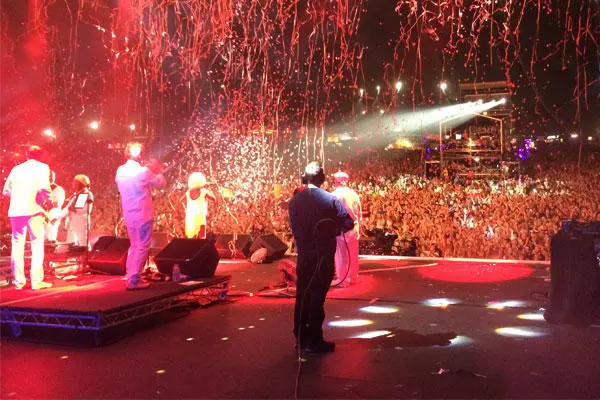
Why Solent?
After sixth form, I took a year out before starting university. I visited Solent the year before and when I went back the following year for an open day the course leader, James, recognised me and I felt like that was a good sign of what the university and lecturers were like.
If you enjoy music, going to gigs and want to be part of the industry from a more behind-the-scenes position, Solent is definitely for you.
What was the best thing about your course?
The lecturers were super approachable. Whether it was about the course, advice for getting industry experience, or just general support. It’s clear from the start of the course that they all have a strong understanding of the industry, as well as contacts across all different areas of the business. Hearing about their experiences – the people they met and the things they had done – were definitely wow moments.
How did Solent help you prepare for working in the music industry?
The course definitely helped me prepare for my career. The knowledge we learnt helped me with answering questions in interviews, and I still use a lot of it in my job today, including the type of rights songs have, as well as copyright and contract law.
We also had a lot of practical opportunities – most of the venues in Southampton were open to students helping out or getting part time jobs there. There were also a lot of opportunities to volunteer at festivals both locally and outside of the city.
Our final project in the third year was about using what we’d learnt throughout the course to put together a business plan of a live event, podcast, music magazine, or anything in between. This gave us the opportunity to get practical experience in whatever area of the industry we hoped to go into after graduating.
What was it like being a student at Solent?
It was great. There’s a great music scene and loads of gigs to go to around Southampton, and it’s really easy to travel to other cities close by.


I met one of my closest friends on the first day of my course, and I took away friends and experiences which helped me become more confident to get a job in the music industry.
Tell us about your career so far
After graduating in 2020, I worked in an admin role while interviewing for roles within music. I then started working at Warner Chappell Music in 2022 as a UK royalties administrator, where I dealt with writer statements and client queries before moving to a role in income tracking. During that time, I was responsible for collecting any missing income for writers in Australia, Benelux and the Nordics.
Earlier this year, I joined Audio Network as their royalty tracking and legal coordinator, continuing income tracking as well as working with composer contracts and licensing.
Did you face any challenges starting out in the industry? If so, how did you overcome them?
It took a long time to find a job in the industry, and I had to do a lot of interviews which can affect your confidence. But you just have to keep trying and something will eventually come up!
Tell us about a typical working day for you
I usually spend the first part of the morning sending out contracts or following up with anything we need for a contract, and then spend the rest of the day on whatever tracking project needs to be completed. I also upload licenses to be sent to production companies throughout the day.
My goal is to go into the legal side of the music industry and, as I’m now in a role with legal responsibilities, I’m excited about getting experience in music law and working out what kind of role I’d like to have in the future.
What’s been your career highlight so far?
While working at Warner Chappell I had the opportunity to go to Stockholm to develop processes and build our team together. I love travelling and having the chance to travel for work was an incredible opportunity. Also – getting to go to so many gigs with work!
I’ve also found the music industry really welcoming, particularly in music publishing; everyone is really friendly and chilled. It’s definitely not the cazy atmosphere I thought the industry was like!
What advice would you give to someone wanting to work in the industry?
I would say, go to as many networking events as you can; chat to people and find out how they got to where they are; find people on LinkedIn with similar roles to the one you’re interested in and see what experience they have. If you’re struggling to get the role you want in the industry, try and get a job in a different one – even if it’s completely unrelated – as you get so many transferrable skills that will help your CV when applying to the roles you want.














